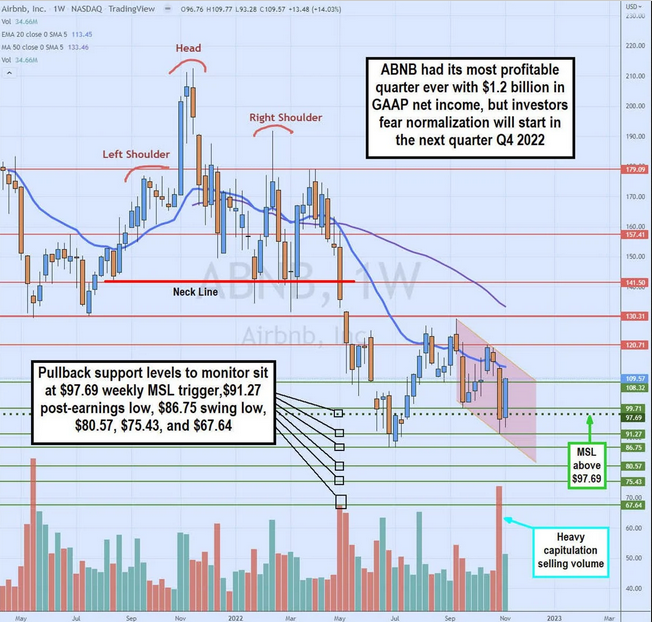Use the Airbnb Stock Implosion to Your Advantage
MarketBeat.com | Nov 17, 2022 03:14AM ET
- Airbnb had its most profitable quarter in history with a GAAP net income of $1.2 billion, up 45% YoY
- Investors may be overly paranoid from the company stating that Q4 bookings “would moderate slightly from Q3”
- While trading at 42X seems expensive, it’s only valued at 20X free cash flow
- Airbnb’s asset-light model gains more supply from new hosts in weaker economic times as homeowners are even more motivated to earning extra side income
Digital lodging platform Airbnb Inc (NASDAQ:ABNB) shares took a plunge on its Q3 2022 earnings release as the forward guidance was tepid. The company was “born” in 2007 as a digital booking and home rental platform connecting hosts with guests to rent out their property for days to weeks.
It’s an asset-light business model very much like Uber (NYSE: NYSE:UBER), Door Dash (NYSE: DASH), and Lyft (NASDAQ: NASDAQ:LYFT) where Airbnb plays the role of the middleman connecting both sides and taking a commission on the transaction.
Unlike Uber and LYFT, Airbnb is actually profitable on a GAAP basis. It joins the ranks of other travel hosting services, including Booking.com (NASDAQ: NASDAQ:BKNG), Expedia (NYSE: NASDAQ:EXPE), and TripAdvisor (NASDAQ: NASDAQ:TRIP). Airbnb has made a stunning recovery into the black and in GAAP form since 2021.
The company felt the sting of a strong US dollar but still remained firmly profitable. However, the US dollar impacts are expected to continue to be a headwind in the near future, with impacts to its ADR starting in Q4. So far, the effects of higher inflation and waning consumer discretionary spending haven’t impacted earnings.
Recessions Bolster New Host Growth
Airbnb was born during the 2007 housing bubble. The company noted how its New Hosts on Airbnb grew rapidly, just as in the 2008 normalization to trigger. However, Airbnb claims it’s up against tough year-over-year comparisons for Q4 and hasn’t noticed a material change in consumer spending as demand remains strong.
They also stated that new tailwinds such as long-term stays and non-urban travel are “here to stay” stemming from the flexibility of remote work and the elastic office. Most importantly, they saw the recovery of both urban and cross-border travel, which comprised the majority of its business pre-pandemic. Guests continue to stay longer (28 days or more), making up 20% of the total gross nights booked. Are investors overreacting to the possibility of normalization? As long as shares stay above the $100 level, the market believes so.

Here’s What the Chart Says About ABNB Stock
The weekly downtrend on ABNB triggered the neckline breakdown of the head-and-shoulders (HS) pattern through $141.50 in May 2022. This caused the weekly 20-period exponential moving average (EMA) to fall, creating a widening channel away from the weekly 50-period MA, which is now at $113.45 and $133.46, respectively.
Both MAs are upside resistances that are still falling. ABNB shares collapsed on earnings to hit a low of $91.27 on hefty selling volume indicating potential capitulation. Shares rallied the following week, propelled by the weekly market structure low (MSL) buy trigger on the breakout through $97.69.
The upside-falling channel resistance sits above the weekly 20-period MA, around $116.35. Key pullback supports levels to watch sit at the $97.69 weekly MSL trigger, $91.27 post-earnings low, $86.75 swing low, $80.57, $75.43, and $67.64 wish list price level.
Original Post
Trading in financial instruments and/or cryptocurrencies involves high risks including the risk of losing some, or all, of your investment amount, and may not be suitable for all investors. Prices of cryptocurrencies are extremely volatile and may be affected by external factors such as financial, regulatory or political events. Trading on margin increases the financial risks.
Before deciding to trade in financial instrument or cryptocurrencies you should be fully informed of the risks and costs associated with trading the financial markets, carefully consider your investment objectives, level of experience, and risk appetite, and seek professional advice where needed.
Fusion Media would like to remind you that the data contained in this website is not necessarily real-time nor accurate. The data and prices on the website are not necessarily provided by any market or exchange, but may be provided by market makers, and so prices may not be accurate and may differ from the actual price at any given market, meaning prices are indicative and not appropriate for trading purposes. Fusion Media and any provider of the data contained in this website will not accept liability for any loss or damage as a result of your trading, or your reliance on the information contained within this website.
It is prohibited to use, store, reproduce, display, modify, transmit or distribute the data contained in this website without the explicit prior written permission of Fusion Media and/or the data provider. All intellectual property rights are reserved by the providers and/or the exchange providing the data contained in this website.
Fusion Media may be compensated by the advertisers that appear on the website, based on your interaction with the advertisements or advertisers.